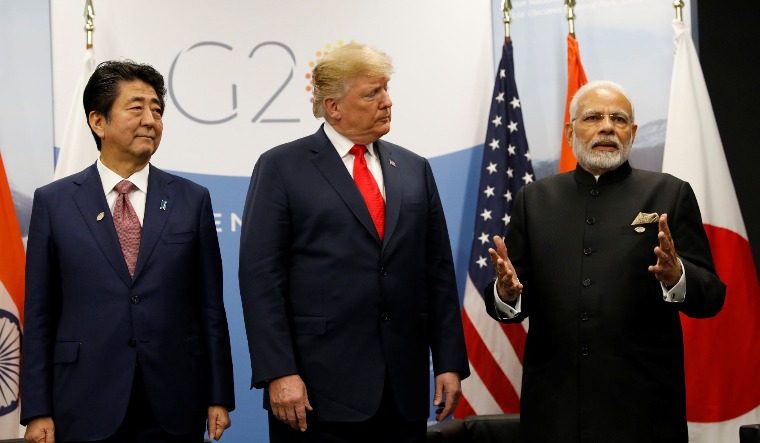Arguing that New Delhi had failed to assure the US it would provide equitable and reasonable access to its markets in numerous sectors, US President Donald Trump on Monday informed the US Congress about his intent to terminate the designation of India and Turkey as beneficiary developing countries under the Generalised System of Preferences (GSP) programme.
In a letter to the Speaker of the US House of Representatives, Nancy Pelosi, Trump said he determined that New Delhi had "not assured" the US that it would "provide equitable and reasonable access" to the markets of India. "I will continue to assess whether the Government of India is providing equitable and reasonable access to its markets, in accordance with the GSP eligibility criteria," Trump said in his letter, a copy of which was released to the press.
In a separate letter, Trump also informed the Congress of his intent to terminate the GSP beneficiary designation of Turkey. This was primarily because the economy of Turkey had improved a lot in the last four-and-a-half decades, he said. "In the four-and-a-half decades since Turkey's designation as a GSP beneficiary developing country, Turkey's economy has grown and diversified," he said.
"Increases in gross national income per capita, declining poverty rates and export diversification by trading partner and by sector are all evidence of Turkey's increased level of economic development. In addition, Turkey has graduated from other developed countries' GSP programmes due to its increase in economic development or through reciprocal arrangements," Trump argued.
Trump's letter to Pelosi could be seen as a major setback in the India-US bilateral relationship, in particular in the arena of trade and economy.
In a separate statement, the US Trade Representative (USTR) said India's termination from GSP followed its failure to provide the US with assurances that it would provide equitable and reasonable access to its markets in numerous sectors.
"By statute, these changes may not take effect until at least 60 days after the notifications to Congress and the governments of India and Turkey, and will be enacted by a presidential proclamation," the USTR said.
Under the US GSP programme, certain products can enter the US duty-free if the beneficiary developing countries meet the eligibility criteria established by Congress.
Also read
- Elon Musk proposes changes to H-1B visa: Raising minimum salary and more
- Jimmy Carter dies at 100: Trump, Biden, Obama, Bush and Clinton pay tribute to former US president
- Elon Musk's X witnessing Vivek Ramaswamy warring Donald Trump's right-wing hardliners over skilled immigration, why?
- Did Elon Musk remove X verification of H1-B visa critics? Here's why Donald Trump may allow more skilled Indian immigrants
- Trump vs China could mean Rs 2 lakh crore windfall gain for India
The GSP criteria include respecting arbitral awards in favour of US citizens or corporations, combating child labour, respecting internationally recognised worker rights, providing adequate and effective intellectual property protection and providing the US with equitable and reasonable market access. Countries can also be graduated from the GSP programme, depending on factors related to economic development.
The Trump Administration had launched an eligibility review of India's compliance with the GSP market access criterion in April 2018.
"India has implemented a wide array of trade barriers that create serious negative effects on United States commerce. Despite intensive engagement, India has failed to take the necessary steps to meet the GSP criterion," the USTR said.
-PTI



